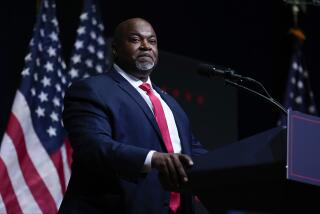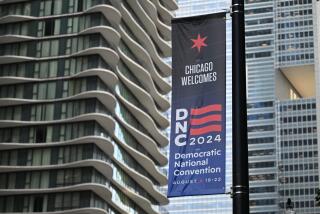Do We Want a National Primary? : Democrats Flirt With Disaster by Pushing for a March Vote
- Share via
Over the years the Democratic Party has come up with a potpourri of strategies to give each state its voice in choosing the best presidential candidate. Now, in a parochial urge to have the most impact, the 50 voices threaten to become a clamor. The stampede of states moving their primaries to early March is being dubbed mega-, super-duper, or even Titanic Tuesday.I call it Me-Too Tuesday, with everyone voting at once without the chance to study the candidates.
The old calendar wasn’t perfect, but it was possible to observe the would-be nominees over several months and get some sense of them. We could analyze their stands as well as their charisma and see how they held up under fire. Some people actually got to share ideas and a cup of coffee with a future President.
Oddly, instead of working toward a schedule that provides for an even more deliberative process, we’re scurrying in the opposite direction.
Alabama, Florida and Georgia started the trend back in 1984 with high hopes of nominating a conservative candidate who would then carry the South for the Democrats in November. That strategy got lots of attention, but the results were not as intended. John Glenn, the seeming heir to the Southern hero vote, fared poorly. Gary Hart, a 3% candidate two weeks before, rose to 35% and but for a few thousand votes would have been enthroned. Walter Mondale wasn’t completely wiped out. Jesse Jackson scored more significantly than some had anticipated.
Now the South is promoting an even more frantic rush-to-judgment regional primary. Never mind the lesson of 1984. The results of an early jump-off in 1988 will probably just be another mishmash: no candidate sweeping the region, New Hampshire’s new face coming on strong, Jackson getting a block of delegates, and the front-runner with the most money doing OK. Not much impact, but this time the South won’t get a second chance to speak.
That’s because the 11 states of the Confederacy plus the four border states all want to be heard on March 8, 1988. At least 13 others also will have voted by then. In fact, just three weeks after the New Hampshire primary, about 35% of the delegates to the Democratic National Convention will be chosen.
What does the rest of the country have to say about this? A resounding Me Too! Instead of putting on the brakes, discussions are taking place on an early primary in the Rocky Mountain states, which are eager to see more of a candidate than the belly of his plane. New Jersey and Ohio are moving up. And the biggest prize of all, California, is studying a change to--you guessed it--Me-Too Tuesday.
California’s reasoning is not without merit. The Golden State wants to be a player, and with almost 10% of the convention delegates, it deserves to do more than just export Democratic dollars to races in other states. If California’s primary were moved up from June, Western individualism could balance Southern traditionalism. The country’s population shift would be mirrored. The potential for having an impact might improve the state’s declining voter turn-out.
Waiting until June, however, could mean voting on a field narrowed to Tweedledee and Tweedledum, or, worse yet, only one of them. Given the dilemma of jumping the gun or irrelevance, you can hardly expect California to be laid back on this issue.
Still, one state’s restraint for the good of the system won’t save it. If all of the South, Texas, parts of New England and the Midwest, plus several now-undecided Northwestern and Mountain states go to bat March 8, almost half of the elected delegates will be committed when the polls close. Possibly the nominee will be chosen. Certainly the nomination process will be a shambles.
Instead of the ongoing local and national scrutiny of a candidate returning to a region for several primaries, most of the voters’ participation would be over at the beginning. There would be no opportunity to build knowledgeable consensus.
At the same time, to survive the Ides of March, the candidates would be even more dependent on big money, slick commercials, special-interest groups that can mobilize their troops, regionalism, media hype, games that campaign managers play.
We are careering toward a de facto national primary, certainly not the desired prudent and thoughtful process. No one seems willing to stop it.
Creating a logical schedule requires national leadership, motivation and toughness. Incentives can be established and ground rules mandated just as they were for delegate selection. Regional concerns can be better addressed by votes throughout the campaign season.
With a well-ordered calendar a state’s impact will be crucial in the middle of the primaries for a comeback or a draft, and later for the shoot-out or final victory. The reasonable involvement of the super-delegates, elected officials and party pros, would add to the process. Most important is the opportunity for careful selection of the best nominee.
To accomplish this, Democrats must rise above regional interests and power plays and do what is best for the nation. Having the playoffs in March makes one wonder if the best team will be up in November.
More to Read
Get the L.A. Times Politics newsletter
Deeply reported insights into legislation, politics and policy from Sacramento, Washington and beyond. In your inbox twice per week.
You may occasionally receive promotional content from the Los Angeles Times.









